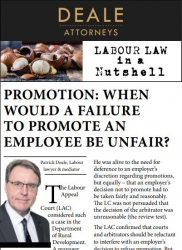|
2020-04-10 Promotion: when would a failure to promote an employee be unfair? Patrick Deale, Labour lawyer & mediator
The Labour Appeal Court (LAC) considered such a case in the Department of Rural Development. A manager referred to as "M" had been doing the job in an acting capacity for four years. The qualification requirement for the post was advertised in 2011 as 'B.Sc Agriculture or equivalent qualification in Agricultural Economics or Economics'. M had the qualification for this requirement. The advertisement was withdrawn and advertised again in July 2011. The selection criteria were exactly the same - except for the degree requirement which was changed to - "B.Sc in Agricultural Economics/ Development/Economics/ Statistics/Marketing'. M did not have this B.Sc qualification so he was not considered. The MEC then suspended all recruitment and selection processes until further notice before an appointment was made. M referred a dispute to the bargaining council. He claimed that the Department's failure to promote him to the post for which he was suitably qualified was an unfair labour practice. The arbitrator concluded that the failure to promote M constituted an unfair labour practice. He found that M was the only candidate eligible for appointment and one who had demonstrated competence and exemplary performance in the post. For these reasons, the arbitrator placed M in the position. The Department took the award on review to the Labour Court (LC). The LC found that the arbitrator properly considered relevant issues that merited the promotion. He was alive to the need for deference to an employer's discretion regarding promotions, but equally - that an employer's decision not to promote had to be taken fairly and reasonably. The LC was not persuaded that the decision of the arbitrator was unreasonable (the review test). The LAC confirmed that courts and arbitrators should be reluctant to interfere with an employer's decision to refuse promotion. But they may interfere if - ???There is evidence that the employer acted on the basis of some unreasonable, irrelevant or invidious consideration; or ???The decision was arbitrary, capricious or unfair; or ???The employer failed to apply its mind to the promotion or acted in bad faith; or ???Where there is no rational relationship between the decision not to promote, the purpose of the promotion and the information upon which the decision is based ???The LAC found that the arbitrator's reasoning in his award showed that he fully understood these principles and that the relief granted by the arbitrator was entirely reasonable. TIP: The principles described by the LAC will serve as useful guidelines for employers to follow when making decisions about promotions. They essentially provide an insight of how the LC would assess whether an arbitrator made a reasonable decision in a case involving the fairness or otherwise of an employer's decision to promote or not to promote an individual. Department of Rural Development and Agrarian Reform v General Public Service Sectoral Bargaining Council and Others(PA3/18) [2020] LAC 4 (6 January 2020) Source: Worklaw Newsletter February 2020 Offices in KZN and Johannesburg C: 083 375 8771 E: patrick@deale.co.za Skype: patrick.deale W: www.deale.co.za |
Copyright © 2026 KwaZulu-Natal Top Business
